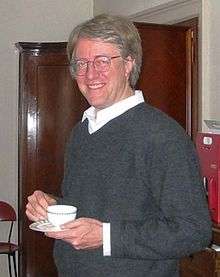Norman Packard
Norman Harry Packard (born 1954 in Billings, Montana)[1] is a chaos theory physicist and one of the founders of the Prediction Company and ProtoLife. He is an alumnus of Reed College and the University of California, Santa Cruz. Packard is known for his contributions to both chaos theory and cellular automata. He also coined the phrase "the edge of chaos".[2][3]

Biography
Between 1976 and 1981, he worked with fellow graduate students in Santa Cruz, California, forming the Eudaemons collective with J. Doyne Farmer and others, to develop a strategy for beating the roulette wheel using a toe-operated computer. The computer could, in theory, predict in what area a roulette ball would land on a wheel, giving the player a significant statistical advantage over the house. Although the project itself was a success, they ran into great practical difficulty employing the technique on-site in Las Vegas casinos, and many of the members left to pursue other fields of academia. The experiences of Norman, Doyne Farmer, and crew were later chronicled in the book The Eudaemonic Pie (1985) by Thomas Bass. Their experience was also chronicled on the television series "Breaking Vegas."
Around the same time, he formed the Dynamical Systems Collective with friends Rob Shaw, Doyne Farmer, and James Crutchfield. The collective was best known for its work in probing chaotic systems for signs of order.
In 1982, Packard left Santa Cruz for France to take a post-doctoral fellowship at the Institut des Hautes Études Scientifiques in Bures-sur-Yvette, France. He left after one year and joined the Institute for Advanced Study. At the IAS, he worked with Stephen Wolfram and friend Rob Shaw to explain cellular automata and the tendency for matter to organize itself.
Professional work
Center for Complex Systems Research
In 1985 Packard moved with Wolfram to the physics department of University of Illinois, where he eventually became an associate professor, and where he was a founding member of the Center for Complex Systems Research.
Santa Fe Institute
Packard was involved with the Santa Fe Institute over many years, in several capacities including external professor and member of the science steering committee.
Prediction Company
In the spring of 1985, Packard and Doyne Farmer realized that their research in fields such as chaos, Genetic Algorithms and cellular automata could help build a system for predicting the stock market. Five years later they founded Prediction Company, a small company dedicated to making a model for predicting what a market would do during a certain time period. A brief outline of some of the genetic algorithm techniques he used in the early days is presented in chapter 2 of reference 5 below. In 2004, Prediction Company received the "Employer of Choice" award in the small size category for the State of New Mexico.[4] The company still exists today as a subsidiary of Swiss bank UBS AG.
European Center for Living Technology
Packard was one of the founders of the European Center for Living Technology (ECLT), hosted by the University of Venice, Ca' Foscari.[5] The ECLT received its first funding from PACE (Programmable Artificial Cell Evolution), a project coordinated by John S. McCaskill and funded by the European Union.[6] From its inception in 2004 and for over a decade Packard has served on its science board, and as co-director.
ProtoLife
In 2004, Packard founded ProtoLife, the first company to capitalize on living technology. The goal of the company is to optimize complex chemical reactions and other complex processes. The company was launched in Venice, Italy, and is currently based in San Francisco having changed name to Daptics[7] (see below).
Lucky Sort
In 2011 Packard joined Lucky Sort[8] as Chief Science Officer. At Lucky Sort he guides research to discover and display structure in high volume text data streams.
Daptics
In 2018, Packard launched a web-based optimisation and discovery tool on the internet, changing the company name from ProtoLife to Daptics[9], to better reflect its new focus. The goal of the company is to optimize complex chemical reactions and other complex processes. The company is currently based in San Francisco.
Books
- Artificial Life VII, with Mark A. Bedau, John S. McCaskill, Steen Rasmussen. 2000
- Protocells, with Steen Rasmussen, Mark Bedau, Liaohai Chen, David Deamer, David Krakauer, and Peter Stadler
See also
References
- Thomas A. Bass, The eudaemonic pie, Houghton Mifflin, 1985, p.26
- Packard, Norman, "Adaptation Toward the Edge of Chaos", 1988
- Bass, Thomas A., The Predictors, 1999, Henry Holt Publishing, p. 138
- Prediction Company: Company Profile Archived 2006-09-02 at the Wayback Machine
- European Center for Living Technology
- Programmable Artificial Cell Evolution
- Daptics
- Lucky Sort Inc. Archived 2013-01-15 at the Wayback Machine
- Daptics
- An Introduction to Genetic Algorithms by Melanie Mitchell, MIT Press, 1998.
- Chaos: Making a New Science by James Gleick.